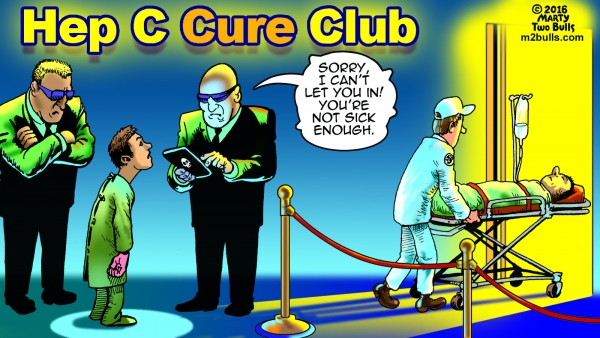The development of Hepatitis C Direct-Acting Antiviral medications (DAAs), and their introduction to the market in 2013, was a major victory in the fight against the HCV virus. It was a breakthrough that rivalled the invention of penicillin because while penicillin was the first really effective drug invented to treat bacterial infections, the DAA Sofosbuvir was our first ever cure for a virus. Unfortunately, the excitement was short lived due to the high price tags attached to these breakthrough medications. Harvoni® was priced at $95,000 USD for the standard 12 weeks treatment course, and Epclusa, introduced a couple of years later, didn’t provide much relief in terms of price, it costs $75,000 USD for the standard 12 weeks treatment course. The good news is that there are affordable and licensed generics for both Harvoni® and Epclusa® available in some countries, and globally online, but more on that later.
HCV is made up of 6 subtypes, called genotypes. There are DAA medications that treat certain genotypes only, such as Harvoni® which is indicated for genotypes (1,4,5,6), while others, such as Epclusa® are pan-genotypic, meaning they can treat all 6 genotypes. In this post, we will identify the best possible treatment for the most common genotype in the world, genotype 1. Is it Harvoni® or Epclusa®? If you have genotype 2 or 3 (the third and second most common genotypes respectively) you don't need to read further - for you generic Epclusa® is the correct choice as Harvoni® is not very effective for these genotypes.
Cure rates
The chances of getting rid of the virus is obviously one of the most important criteria when choosing a medicine. The good news is that based on a multitude of large studies, both drugs resulted in cure rates over 90% ie they are both remarkably effective. However, one was a bit more effective than the other.
Harvoni® (Sofosbuvir/Ledipasvir) in the Ion-1 and Ion-2 large clinical trials for genotype 1, treatment naive and treatment experienced patients, with and without Cirrhosis, had an average cure rate (i.e. patients reaching SVR24) of 96.1%.
Epclusa® (Sofosbuvir/Velpatasvir), in the Astral-1 large clinical trial for treatment naive and treatment experienced patients, with and without Cirrhosis, 323 of 328 genotype 1 patients (98.5%) achieved cure. No difference was observed by subtype (98% in 1a; 99% in 1b).
From the figures above, you can see that Epclusa® is a bit more effective in treating HCV genotype 1 patients than Harvoni®. It's also noteworthy that data from these studies indicate that the side effects profile of the two drugs is similar, it's very mild in nature, and doesn’t lead to treatment interruptions, as was many times the case with the older Hepatitis C treatment (i.e. PEG Interferon & Ribavirin).
Multiple genotype infection
Many patients do not realize that it's possible to be infected with two genotypes at the same time, in reality, this happens in a certain percentage of patients. Several studies have found concurrent genotype infections at rates of 5%-25%. In these cases, one genotype will prevail as the majority (dominant) variant. The problem is that sometimes the minority genotype is not detected when patients are tested before treatment, this happens if the PCR test used is not of high sensitivity, as observed in this study. In these cases, if the medication used for treatment is effective against the majority genotype only, the minority genotype can expand after the majority one is successfully eradicated, causing the overall treatment to fail.
Genotypes 1 & 2 are the most common mixed genotypes infections, and this can be a real problem when genotype 1 is the dominant genotype, because if a medication that is not effective against genotype 2 is used, such as Harvoni®, there is a good chance the patient will not be cured. Hence, using pan-genotypic medications, such as Epclusa®, will indeed solve the problem of undetected multiple genotypes infections.
Price tag and generic availability
Due to the outrageous price tags of originator (brand name) Harvoni® and Epclusa®, patients have to either be very rich or be eligible for insurance treatment to access them, and the vast majority of patients are neither. Insurance companies, because of these new medicines very high price tags, denied treatment to patients unless they were in a very late disease stage, defined as severe liver fibrosis (i.e. F3 or F4). This left 90% of patients unable to access originator Harvoni® and Epclusa® and having to look for overseas sources that supply generic versions. But how can patients safely access high quality licensed generics on the internet that are of the same quality as the brand name medications? It’s not difficult at all actually, founded by the Australian doctor James Freeman, FixHepC is one such supplier, and if you read this earlier post on buying generic Harvoni®, you’ll learn why.
Conclusion
We can see from all the published results of various clinical studies investigating Harvoni® and Epclusa® that the cure rate with the latter is a bit higher. This may very well be due to the multiple genotype infections that exist in a small percentage of patients. So, if you're a Hepatitis C genotype 1 patient looking for a medication that offers the highest possible chance of cure, you should consider originator or generic Epclusa® which offers a small but measurable higher cure chance than Harvoni®.
If you'd like to find out more about accessing generic Hepatitis C medication please visit our home page. If you're skeptical that cure can be obtained for an affordable price please visit our forum where you can hear from real patients, both past and present, as they navigated their personal journey to cure.


